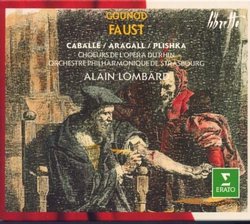| All Artists: Gounod Title: Faust-Lombard Members Wishing: 0 Total Copies: 0 Label: Elektra / Wea Release Date: 4/16/1996 Genre: Classical Style: Opera & Classical Vocal Number of Discs: 3 SwapaCD Credits: 3 UPC: 022924568527 |
Search - Gounod :: Faust-Lombard
 | Gounod Faust-Lombard Genre: Classical
|
Larger Image |
CD Details |
CD ReviewsCaball�, Aragall and Plishka in a good but slightly listless L. E. Cantrell | Vancouver, British Columbia Canada | 01/31/2008 (4 out of 5 stars) "SOURCE: 1976 analogue recording made at Palais de la Musique et des Congrès, Strabourg, digitally re-mastered in 1991.
SOUND: Acceptable analogue stereo. Purely as a matter of personal taste, I prefer a more up-close and immediate soundscape. To my ear, the singers, chorus and orchestra all seem unnecessarily distant. This is particularly true of the chorus and, in my opinion anyway, serves to weaken the impact of their big numbers. CAST: Faust - Giacomo Aragall (tenor); Marguerite - Montserrat Caballé (soprano); Méphistophélès - Paul Plishka (bass); Valentin - Philippe Huttenlocher (baritone); Siébel - Anita Terzian (soprano); Marthe - Jocelyne Taillon (mezzo-soprano); Wagner - Jean Brun (baritone). CONDUCTOR: Alain Lombard with the Orchestre Philharmonique de Strasbourg and Choeurs de L'Opéra du Rhin. TEXT: Running to three hours and thirteen minutes, this set gives us most, but not quite all of "Faust." (The Plasson recording on EMI is a little more complete and runs more than ten minutes longer with appendices for music cut out by Gounod.) Frankly, though, this set gives me all of "Faust" that I care to hear--and then some! "Faust" was originally written as an opéra comique, that is, with spoken dialogue between the musical numbers. It was for the production at Strasbourg a few years later that the composer finally added the necessary sung recitatives to make "Faust" a "grand opera" (and therefore suitable for a profitable appearance at the Paris Opera.) Valentin's "Avant de quitter ces lieux" was added at the London premier as a bonbon for a prominent English baritone of the day. This recording presents the grand opera version--with the bonbon. DOCUMENTATION: Libretto in French, English and German. Plot summary by act. Short, unsigned, very European and rather charmingly pompous essay on the Faust legend, the development of the opera and the supposed magnificence of "Faust" as a work of art. (The unknown author of the piece is clearly more at home in French than in English and the more pleasing because of that.) Track list that identifies the singers, provides timings and ties into the libretto. COMMENTARY: Let's be perfectly clear on this. There is not and never has been a completely satisfactory recording of "Faust." And, what's more, I don't expect to hear one in my lifetime. Each recording has faults unique to itself. The faults range from excessive soprano droopiness to massive musical amputations, to aggressively un-French style and accents, to atrocious acoustics, to laggard conducting ... to what-have-you. On the other hand, none of the recordings that I've heard have been entirely without merit. And that is true of this one, too, even though it has been the Rodney Dangerfield of recorded "Fausts": it just don't get no respect. In 1992, the Good Grey Gramophone Magazine used such terms as "limited enthusiasm", "doubtful proposition", "funereal", "dilatory" and "peculiar French" to describe the set. With all due respect to The Gramophone, it's not that bad. It is, in fact ... well, OK, sort of. The main fault of this set is the conducting of Alain Lombard. It comes not from any lack of ability on his part, for he has given ample proof of his skills in French opera. It comes from what appears to be his excessive love for Gounod's most famous work. He just l-i-n-g-e-r-s and s-a-v-o-r-s everything. Here's an example: the finale of the opera from Méphistophélès' "Alerte!" to the end runs 5:36 in Cluytens' version with Gedda and de los Angeles, 5:45 in Cleva's old Metropolitan broadcast with Björling and Kirsten, 5:41 in the venerable Beecham version with Noré and Boué, but a full 6:24 in this one. This stately and measured pace sometimes displays Gounod's musicianship to pleasing advantage, but more often it just saps the drama out of the opera. Montserrat Caballé sings Marguerite with grace and fine tone--and more than a little monumentalism. (The Gramophone speculated that some of the slowness was caused by the star's "self-regarding view of Marguerite's music.") Slow or not, Caballé is truly impressive and certainly worth hearing. Giacomo Aragall is Faust and he sings very well, although he was perhaps not quite at his short-lived peak. He was a famous specialist in French opera, but he always strikes me as having a very Italianate vocal technique--and it was at his French pronunciation that The Gramophone sniffed so haughtily. He may occasionally be a little dubious on pitch but his Faust is well-thought out, well-acted and pleasing to hear. Paul Plishka is perfectly sound but more than a little generic as Méphistophélès. He is far from bad, but equally far from being memorable. (I hold the opinion that Méphistophélès has been distorted out of shape by eastern European bassos, starting with Chaliapin. Both his words and his music suggest to me an elegant and insinuating tempter, not a roaring demon. The only recording, so far as I know, that takes such an approach is Beecham's.) The smaller parts are performed adequately--and rather more than that by Tersian as Siébel. On the whole this recording is not great but still well worth hearing. It appears to have been out of print for some years. If you stumble on a copy at a bargain price, snatch it up. I think it deserves four stars." |

 Track Listings (13) - Disc #1
Track Listings (13) - Disc #1